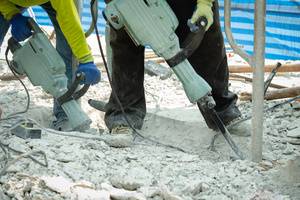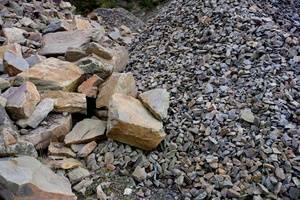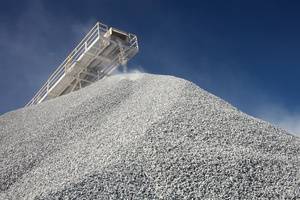Gravel driveways are a great choice for homes of all styles as homeowners can choose stones in a color that complements the aesthetics of their siding and yard. They are also very affordable and do not require much maintenance. If you are relatively handy, you may be able to make your own gravel driveway. Here is a look at what is involved in the process.
Remove The Existing Base

Preparation is often one of the most challenging parts of a driveway project. Getting ready to lay a gravel driveway often involves removing an existing base to ensure there is a firm foundation upon which the driveway can be built. When removing the existing base, it is important to be careful while digging to ensure that you do not damage service pipes for utilities such as water, electricity, sewage or gas. For larger driveways, renting a bulldozer or digger is recommended.
Build A Sub Base
Gravel driveways generally consist of three parts: a subbase, a weed membrane and the gravel itself. The subbase of the gravel driveway is an essential component as this is what will support the heavy loads that pass along your driveway. Laying a subbase also gives you an opportunity to turn an uneven surface into a flat and solid base. A subbase should be laid to a depth of at least 50 millimeters.
The subbase must be compacted using a roller. If possible, it should be sloped away from the garage or the home itself to facilitate the runoff of water. While gravel can technically be placed directly onto firm soil, this is not recommended because it does not form a stable base.
Lay The Weed Membrane
A weed barrier such as landscaping fabric should be rolled out directly above the subbase and underneath the gravel then pegged down into position. Heavy duty weed membranes, such as the polypropylene varieties, can sustain harder wearing and are therefore recommended for gravel driveways. In addition to stopping weeds from emerging through the driveway, they can help keep the gravel cleaner.
Select The Gravel

With the subbase and weed membrane firmly in place, it is time to choose the right type of gravel for your driveway. The type of gravel that you choose will play a critical role in the performance of the driveway. Gravel driveways are generally made up of three layers set with a mechanical tamper. Each one serves a different purpose, such as giving the driveway strength, allowing for drainage, or aiding compaction.
The Base Layer
The base layers should be made up of larger gravel. Number 1 angular gravel, which is roughly the size of a baseball, is a good choice for the foundation of the driveway. It is produced by rock-crushing machines and features a number of flat surfaces on each piece that can interlock to form a more durable driveway, making it a superior choice to round gravel, which tends to move easily under the weight of passing vehicles.
The Middle Layer
The middle layer of a gravel driveway should be formed using medium-sized gravel. Experts recommend #4 angular gravel, which is roughly the size of a golf ball. This gravel will fit well between and against the bigger gravel found in the foundation to create a more solid base for your driveway. This layer should be approximately four inches thick.
The Top Layer
For the top layer of your driveway, lay a four-inch layer of #57 gravel. This gravel contains pieces that are roughly the size of a nickel and will sit well between and against the bigger gravel found in the layers beneath it. In addition, #57 gravel contains rock dust, which allows the pieces to adhere to one another better.
When laying the gravel, be sure to build a higher crown in the center so that water can run easily from the middle of the driveway toward the sides. You may also choose to lay edging along the sides of the driveway, such as bricks or large stones, to help keep the gravel in place and create a neater appearance.
Determine The Amount Of Gravel You Will Need For Each Layer
To determine how much gravel to order, begin by measuring the length and width of the driveway you plan to build in feet. Multiply these numbers together to determine the overall square footage of the driveway. For example, if the driveway is 10 feet wide and 20 feet long, its overall size will be 200 square feet.

Next, multiply this number by the depth you plan to lay each layer to calculate the number of cubic feet of gravel that will be needed for each layer. Four inches is considered a standard height for the layers in a gravel driveway. If you are aiming for four-inch layers, simply divide the overall square footage by three because four inches equals 1/3 of a foot.
Once you have determined the volume of stone needed in cubic feet, you will need to divide the number by 27 to calculate the number of cubic yards you will need. In general, you should get 1.4 tons of stone per cubic yard, and allow for 4 percent more to account for compaction. Multiply the number of cubic yards by 1.4 and then by 1.04 to determine the total tons of stones needed for one layer.
This calculation can be complicated, so you may find it easier to give your gravel supplier the dimensions of the driveway and allow them to make the calculations. You can do this at the same time as you schedule your gravel delivery.
Spread And Compact The Layers Of Your Driveway
Once you have spread the bottom layer of gravel across the space, you must compact it with a roller to create a strong foundation. Next, you’ll want to lay the middle layer of gravel. Then, neaten the perimeter with a rake before spreading and shaping your surface layer of gravel.
Maintain Your Gravel Driveway
Gravel driveways do not require much when it comes to maintenance. You will need to rake it from time to time to keep its surface level and to remove twigs, leaves and other types of debris. It is also useful to rake the gravel in a way that forms a peak in the middle to facilitate drainage. You may also need to fix any potholes that form.
Reach Out To The Gravel Driveway Professionals
At Dirt Connections, we can help you through every step of your gravel driveway project in the Northern Virginia area. Let our professionals carry out the project from start to finish, or contact us to arrange gravel delivery to your site.
Summary

Dirt Connections was started with one goal in mind: providing quality residential and commercial construction services to clients on time and on budget. Reach out for more information on how we can support your next project.
For your convenience our estimates are free and by appointment. Call 703-940-9949 for a free estimate today!









































